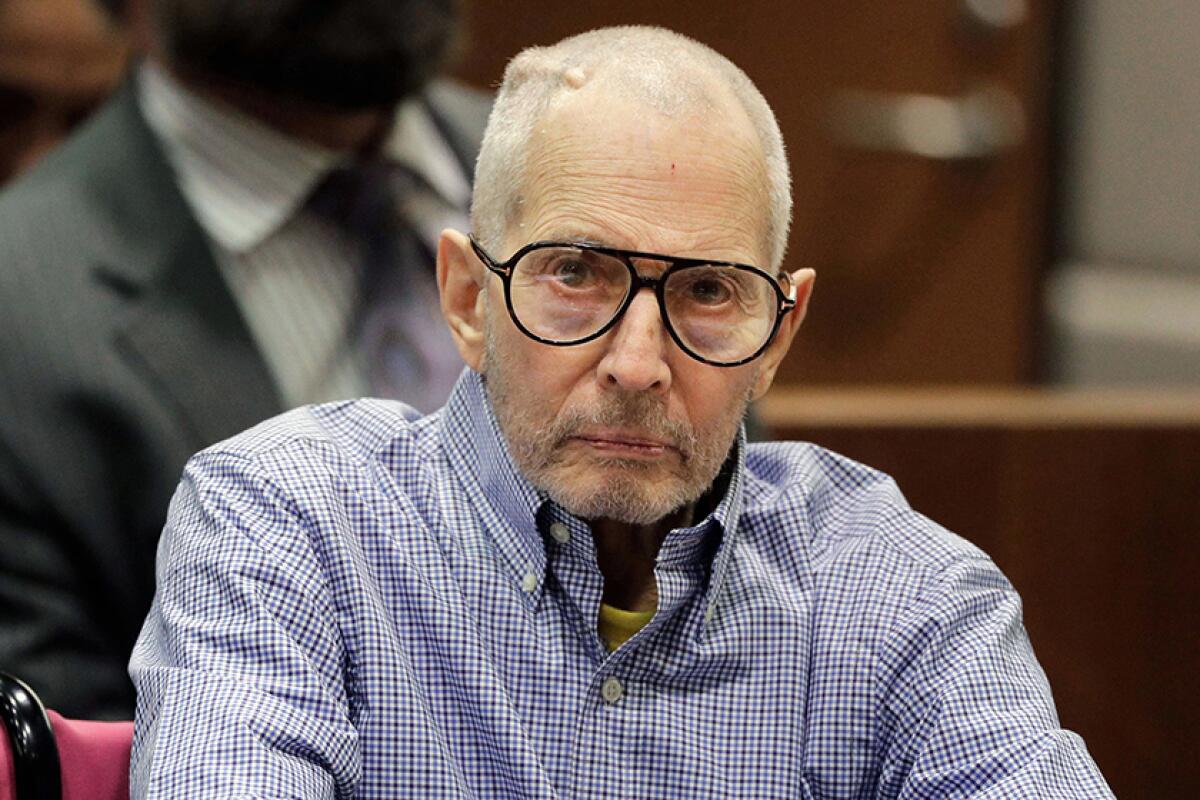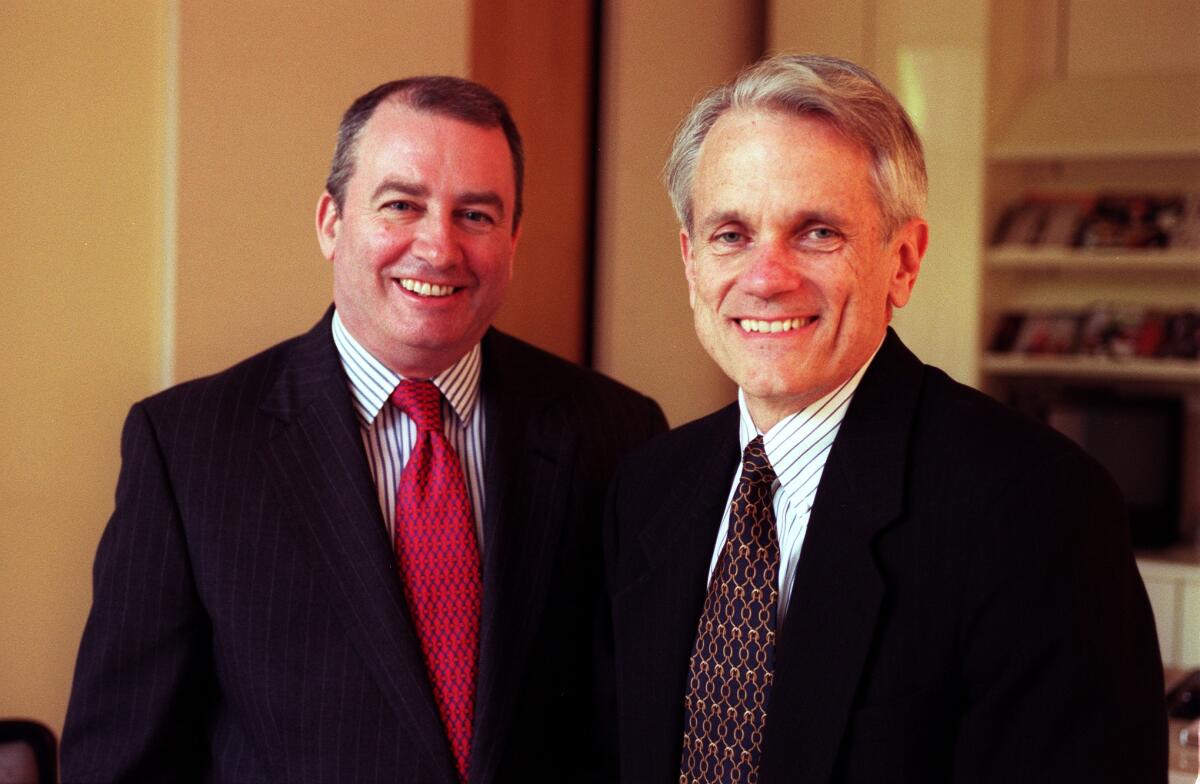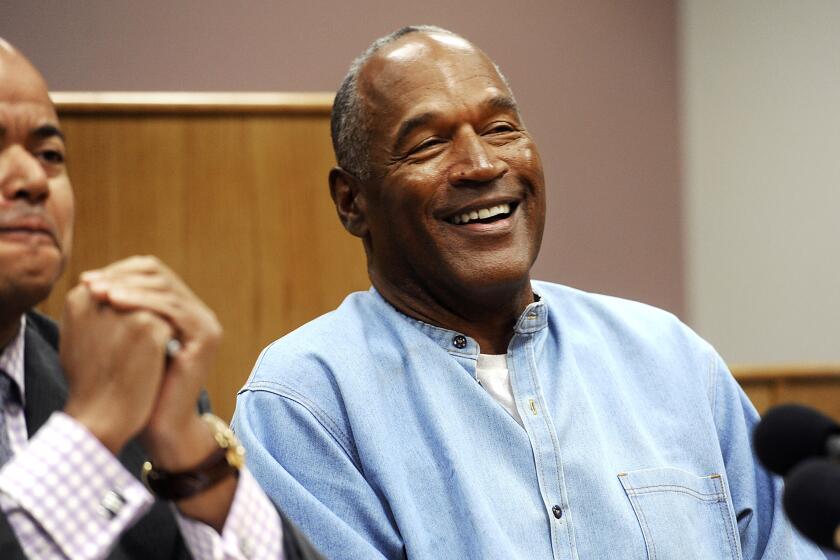The mistake that finally got Robert Durst caught

Good morning, and welcome to the Essential California newsletter. It’s Tuesday, Jan. 11. I’m Justin Ray.
Robert Durst was able to evade legal repercussions throughout his life through disguises, different aliases, address changes and, finally, death.
For the record:
2:07 p.m. Jan. 11, 2022An earlier version of this article stated that a note obtained by producers of “The Jinx” came from Robert Durst’s adopted son. The note actually came from Susan Berman’s adopted son.
Durst, 78, died of natural causes at 6:44 a.m. Monday at a hospital near Stockton, according to a statement by the California Department of Corrections and Rehabilitation.
Several people associated with Durst ended up missing or dead, though he was able to dodge justice for nearly four decades. His first wife, Kathleen McCormack, disappeared in New York in 1982. His close friend Susan Berman was murdered in 2000.
Durst admitted to killing and dismembering his neighbor, Morris Black. He said he inadvertently shot him while wrestling a gun from him. A jury acquitted him in 2003.
Durst has also been investigated for his alleged ties to other cold cases.
His alleged crimes became the subject of podcasts, movies and even merchandise. The trend of people around Durst disappearing in mysterious circumstances inspired the title of “The Jinx,” a six-part HBO documentary series that chronicled his strange life and the suspicions surrounding him.
The biggest reason why Durst managed to avoid being charged for so long appears to be a lack of evidence tying him to crimes. But “The Jinx” presented a damning piece of evidence that he struggled to explain away.
The note that got Durst busted
At the time that his close friend Berman was killed, an anonymous note was sent to Beverly Hills police, telling them they would find “a cadaver” at her house. The note was written in all caps and misspelled the city’s name as “Beverley Hills.” When authorities went there, the note’s assertion was proved true.
For decades Durst denied writing the so-called cadaver note, but in the finale of “The Jinx,” Durst is confronted with what has been hailed as the smoking gun.
In 2012 her adopted son found an earlier letter he wrote to Berman, with the same misspelling and style of lettering. He provided it to Marc Smerling, the cinematographer of the 2015 HBO series.
When confronted with the letter, Durst burped, stumbled over his words, frequently touched his ear and struggled to account for the coincidence (some footage of that confrontation can be seen here).
When the interview was over, Durst went to the bathroom with his microphone still recording and muttered: “I don’t know what you expected to get. I don’t know what’s in the house. Oh, I want this. Killed them all, of course. [Unintelligible] I want to do something new. There’s nothing new about that. ... He was right. I was wrong. The burping. I’m having difficulty with the question. What the hell did I do?”
During the trial in which Durst would be convicted of murdering Berman, he admitted to writing the note but said he found her dead rather than killing her.
“It’s a very difficult thing to believe,” Durst testified. “I mean, I have difficulty believing it myself, that I would write the letter if I had not killed Susan Berman.”
And now, here’s what’s happening across California:
Note: Some of the sites we link to may limit the number of stories you can access without subscribing.
More than 6 million cumulative coronavirus cases have now been reported in California, according to data compiled by The Times — the latest milestone as the Omicron variant continues its record-smashing race across the state. On Monday, the state reported 308,820 new infections, a colossal figure that includes data from both Saturday and Sunday. Los Angeles Times
A neglected California city reinvents itself with electric cars. “Transportation is usually a top-down process where a model is deployed onto a community, hoping that that community adopts it. This did the flip side. It comes from the community.” Los Angeles Times

L.A. STORIES
‘What happens when you pour seven gallons of water into a five-gallon bucket?’ From the deck of a tugboat serving the ports of Los Angeles and Long Beach, the supply chain crisis boils down to this: So little time, so much stuff. Los Angeles Times

Our daily news podcast
If you’re a fan of this newsletter, you’ll love our daily podcast “The Times,” hosted every weekday by columnist Gustavo Arellano, along with reporters from across our newsroom. Go beyond the headlines. Download and listen on our App, subscribe on Apple Podcasts and follow on Spotify.
POLITICS AND GOVERNMENT
California’s overtime pay for farmworkers seen as an example for other states. Only a handful of states, including California and Washington, have granted farmworkers the right to overtime pay. In the Golden State, agricultural industry experts had predicted the pay would bankrupt farms. However, the number of businesses in the state actually increased during the state’s rollout that began in 2016. “If it can work here, it can work anywhere,” said Daniel Costa, director of immigration law and policy research at the Economic Policy Institute. Capital and Main
COVID-19, children, climate change are focal points in Newsom’s budget plan. Built on projections of a ninth consecutive year of surplus tax revenue — a streak that has made California’s deficit-ridden past a distant memory — the $286.4-billion spending plan Gov. Gavin Newsom unveiled Monday builds on the state’s recent efforts to address the COVID-19 pandemic, homelessness and a worsening drought while surpassing K-12 school funding records set just last year. In all, the governor’s plan lays out close to $10 billion in new spending on what a fact sheet from his office calls “five of California’s biggest challenges: COVID-19, climate change, homelessness, inequality, and keeping our streets safe.” Los Angeles Times
CRIME, COURTS AND POLICING
A 48-year-old woman from Redding was identified as a victim in an alleged serial killer case in Virginia. Stephanie Harrison’s body was found near the Moon Inn Hotel in Alexandria. Anthony Eugene Robinson, 35, is the prime suspect in the case and is being held in Rockingham County Jail. Police believe Robinson used dating apps to lure women to motels where he killed them and transported their bodies in shopping carts. He faces four charges including two counts of murder and two counts of felony disposal of human remains. But “that number will go up,” said Fairfax Police Department Bureau Chief Ed O’Carroll. Action News Now
Support our journalism
HEALTH AND THE ENVIRONMENT
Throughout the state, hospitals are canceling or postponing so-called elective surgeries as COVID-19 infections deplete their staff of nurses. The California Department of Public Health is evaluating whether to issue an order to hospitals statewide to suspend them. CalMatters reports that the state health department’s chief deputy director recently told a meeting of county health officers, “We know [a directive on elective surgeries] has to be on the table.” Officials with the public health department did not respond to the outlet’s requests for more information. “Elective” means a surgery is not an emergency and can be scheduled in advance; it does not mean it’s optional. Waiting in some cases can be life-threatening. CalMatters
Column: Mocking anti-vaxxers’ deaths is ghoulish, yes — but necessary. Columnist Michael Hiltzik writes: “Vaccine mandates themselves have been part of the educational system for longer than anyone can remember in every state in the union.” Los Angeles Times
CALIFORNIA CULTURE
‘Pork producers should stop fighting animal welfare law giving pregnant pigs more space.’ The Times editorial board argues that those fighting Proposition 12 — a law that requires more space for breeding animals such as pigs and egg-laying chickens — should put their energy elsewhere. “Instead of spending their money on legal fees to fight the law, pork producers should have been spending it on revamping their hog farms to comply with the law. Some producers have already done so or are in the process,” the board writes. Los Angeles Times
Michael Parks, who won a Pulitzer Prize for his reporting on the struggle to end apartheid in South Africa and later led the Los Angeles Times during a tumultuous period that ended when the Chandler family sold the newspaper after a century of control, died on Saturday. He was 78. In his 25 years as a foreign correspondent, first for the Baltimore Sun and then for The Times, Parks covered some of the most momentous events in modern history, including the Vietnam War and the collapse of the Soviet Union. After nearly three years as top editor at The Times, he taught at USC’s Annenberg School for Communication and Journalism for 20 years and served two stints as director of its journalism school. Los Angeles Times

Free online games
Get our free daily crossword puzzle, sudoku, word search and arcade games in our new game center at latimes.com/games.
CALIFORNIA ALMANAC
Los Angeles: 75 San Diego: Overcast, 72. That cat didn’t need to do the other cat like that. San Francisco: Cloudy 60 San Jose: 66 Fresno: 61 Sacramento: 58
AND FINALLY
Today’s California memory is from Lisa Verga:
I left Ohio in 1978 because I always felt like a fish out of water. It wasn’t until the early ‘80s I found the small, laid-back, beautiful beach city of Seal Beach did I feel I could fully breathe. A job took me away from there, but I always held the special magic of Seal Beach in my heart: the old-town charm of Main Street, the sculptured seal greeting visitors on the pier, the truly kind locals. I’ve lived in six different cities in the last 30 years, but I’m now back for good to lovely Seal Beach.
If you have a memory or story about the Golden State, share it with us. (Please keep your story to 100 words.)
Please let us know what we can do to make this newsletter more useful to you. Send comments to essentialcalifornia@latimes.com.
Start your day right
Sign up for Essential California for news, features and recommendations from the L.A. Times and beyond in your inbox six days a week.
You may occasionally receive promotional content from the Los Angeles Times.




